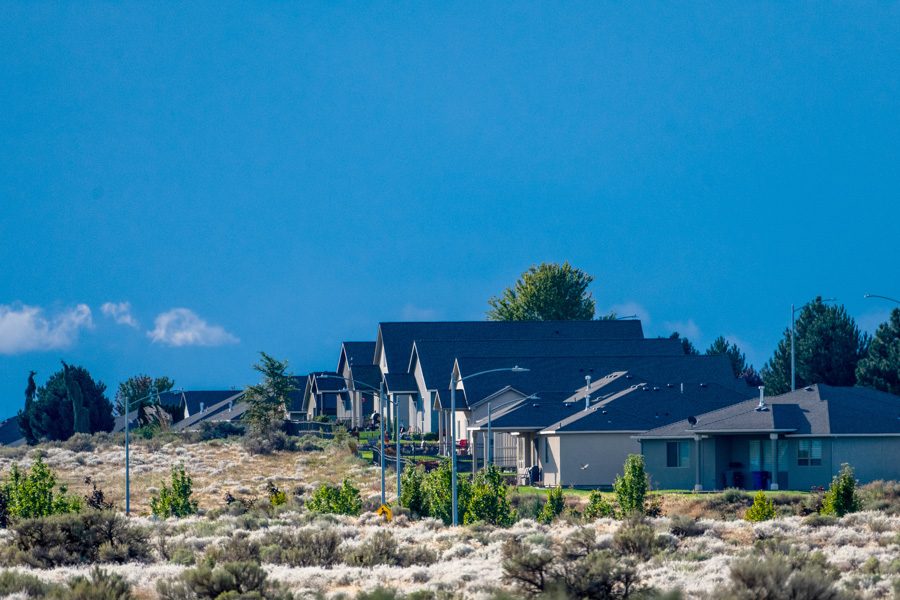
Home » Big commercial projects loom on the horizon
City of Richland
Big commercial projects loom on the horizon

October 14, 2024
Three years of speculation on where Costco might expand in the Tri-Cities ended when the mega retailer applied for permits within the city of Richland on state-owned land, preparing to change both the landscape and the traffic in the Queensgate area.
“This is an exciting opportunity for the Department of Natural Resources, Costco and the local community,” said Courtney James, communications manager for Washington State DNR.
Construction permits filed in August 2024 indicated a new warehouse costing just under $23 million would go onto a 25-acre plot near Kennedy Road and Truman Avenue, west of Target, with a targeted opening date of the following August, though the state is still negotiating the lease with Costco.
“We don’t currently have a timeline for when negotiations are expected to wrap but have been meeting regularly with Costco to work out terms of the lease,” James said. “We’re optimistic about the next steps.”
The head of economic development for the city of Richland said this second store isn’t expected to grow business for Costco as much as it is expected to take pressure off the warehouse in Kennewick, which serves not just the Tri-City region, but the lower Yakima Valley, Walla Walla and northeast Oregon.

This vacant land with a view of Badger Mountain at 3125 Queensgate Drive in Richland was once an orchard but building permits filed with the city of Richland confirm it will be the Tri-Cities’ newest Costco warehouse.
| Photo by Nathan FinkeImproving traffic flow
A Costco would add to an already bustling area that has grown significantly since the region got its second Target more than 15 years ago.
The new warehouse will be accessible from the nearby Duportail Bridge, a $38 million project that opened in 2020 that now sees more than 22,000 vehicle trips per day, providing increased connectivity between central Richland and Vintner’s Square, the shopping center anchored by Target.
The bridge was the most recent major traffic flow change for the city and Richland is gearing up for yet another, with a planned overhaul to the busiest intersection: the southernmost point of George Washington Way, which meets Aaron Drive and Columbia Point Drive near Winco.
A project to widen George Washington Way and add a turn lane out of Columbia Point goes to bid next summer, marking the first effort to improve connectivity through central Richland. An expected 18-month overhaul would conclude with a portion of GW Way open only to northbound traffic, with southbound lanes available on Jadwin Drive, just west of GW Way.
Richland says that work is now likely to begin in early 2026, but will require extensive reeducation to the public, ensuring residents, businesses and visitors are not caught off guard.
Commercial projects
Richland is still waiting for a nationally known, Oregon-based company to begin building a jerky factory in the Horn Rapids industrial area on a 20-acre site at First Street and Kingsgate Way. Beef Expansion LLC, which does business as Old Trapper, received a building permit more than two years ago, but has yet to start construction on a factory expected to bring at least 100 jobs with its initial opening, and doesn’t include future phases.
Richland Economic Development Manager Mandy Wallner said the city is in contact with Old Trapper and it still intends to locate to Richland, it’s just held up by delays tied to an expansion in Oregon.
“They’ve already ordered the parts, but don’t want to start building if it will have to stop and wait also,” Wallner said. “We’re confident they’ll do it and that they’re still coming.”
Old Trapper is one of a few commercial projects planned for the north end of town. “We have been pretty fortunate as far as land sales go,” Wallner said, who said a number of “next-stage” businesses are eyeing Richland as they’ve become more established and want to shed themselves from a lease. The city sold five of its one-acre parcels that were added to the market in the spring of 2024 and are working on making more 5- to 10-acre properties available.
Supporting this development includes a short-rail extension on the mainline rail, owned by the Port of Benton, to help provide access to some of the interior lots. The city owns a spur that comes off the mainline rail and hasn’t extended the line for 25 years. This next one would be designed in phases based on development.
Some of the city’s largest available lots in Horn Rapids, totaling 200 acres, also are getting interest. “One of the things that differentiates our industrial park is that it’s contiguous, in a nice rectangle that doesn’t have weird corners,” Wallner said.
 Development continues to expand the footprint of the Horn Rapids neighborhood of Richland | Photo by Scott Butner
Development continues to expand the footprint of the Horn Rapids neighborhood of Richland | Photo by Scott ButnerShoring up utilities
Richland is focused on shoring up utilities to prepare for potential development, including a multimillion-dollar sewer line extension that could support a $1 billion zero-carbon fertilizer plant considered by Atlas Agro North America Corp.
The Swiss company would locate its Pacific Green Fertilizer Facility on 150 acres, bringing an expected 158 direct living wage jobs and 298 indirect jobs – not including construction on the project.
“Atlas Agro has made tremendous progress on exploring Richland as the site for the world’s first at-scale, green fertilizer production facility, having completed the front-end engineering design phase earlier this summer,” said Atlas Agro’s Dan Holmes, president, North America. “Our Richland office is growing and we continue to work with a broad range of local partners to bring new jobs to the region as we approach (a final investment decision) in early 2025.”
Atlas is one of a few companies that would utilize a newer tax break designed to bring more manufacturers to the state, locating in a Targeted Urban Area, or TUA, which the city designated to include all of Horn Rapids and some of the Richland Airport properties.
Wallner said this initiative is key to making the city attractive to expansion along with it being its own utility.
“(Atlas) was the reason for the TUA; to help bring us together on those numbers and/or get us closer to show timelines which ordinarily would have a value but not enough to get you all the way there – which is why we wanted to stand out and we were lucky to have a forward-looking council to make it happen,” she said.
Right now, the city has four applications looking to take advantage of the savings offered by the TUA, including Atlas Agro, ATI Inc. and two from Framatome. A tax savings is now also being offered by Benton County, which wasn’t part of the original promise, but adds to the competitiveness offered by Richland.
Supporting the growth of potential big businesses also includes shifting the city’s non-potable water system to operate year-round and not just seasonally. “Richland is very fortunate in that we have a large water right that we’ve been able to hold onto for a lot of years,” Wallner said. “It’s the one utility we don’t have a lot of worry about. Power is where we’re constrained.”
Richland hopes to ease that constraint with a project in Webber Canyon managed by Bonneville Power Administration and expected to add additional load and capacity, along with a transmission line – but may not be finished until 2029.
“We’re trying to get 300 megawatts for Atlas and an additional 50 for the city, which could be used for us or could by one of these big customers to get them started,” Wallner said. “The Atlas load is equivalent to what the entire city uses compared with Costco, which may use 1 megawatt, but take up a similar footprint.”

Construction is underway to extend Queensgate Drive at Keene Road in Richland as part of The Terraces at Queensgate South development. A planned roundabout ultimately will connect the road to the south side of Badger Mountain.
| Photo by Nathan FinkeBy the numbers
While Richland officials describe the city as having “land for days,” not all of it is available for housing and the number of single-family homes has yet to return to pre-pandemic numbers, though the city grew a modest 1.4% to more than 64,000 residents in 2024.
Developers pulled permits for 162 single-family homes valued at more than $68 million through August this year, compared to a high of 268 in 2021 and 235 five years ago. Multifamily homes tend to offer more affordability, though these are still lacking in Richland, with just three permits filed through August 2024, compared to numbers typically in the double digits.
Commercial construction in Richland is down for new builds year over year, and still far off the pre-pandemic numbers with 51 permits filed through August 2024, compared to 72 in 2019. Tenant improvements, or remodels, on commercial structures haven’t swayed widely over the years, though the value of the improvements has decreased by almost half.
All construction in Richland, which includes any type of commercial or residential build, totaled 1,245 permits through nearly the end of August in 2024, valued at $172 million. This is down from last year at the same time, when the value was $199 million, and down even further from 2019 when Richland saw $240 million in construction for the same time.
Wallner blames higher construction costs and interest rates for the slowdown, along with it being a presidential election year for a stall to the market, adding that significant changes to the energy codes affected building, but the city is eyeing “several long-range, big projects.”
Residential growth does continue in Badger Mountain South, where the first of two roundabout construction projects kicked off as the summer concluded, both to be paid for by the developer.
The first will be at Dallas Road and Trowbridge Boulevard, expected to be completed by summer 2025, and then a second at Dallas Road and Ava Way, near the entrance to Richland’s Country Mercantile and close to the site of a 10,000-square-foot commercial project.
Darrin Sweeney of The Southfork Group said each roundabout is valued at $2 million to $3 million and will provide safety improvements to this portion of Richland that has ballooned with both single-family and multifamily development, most recently another Affinity-branded complex for ages 55+ along with a new neighborhood, Veneto Villagio. The developer also has added a $1.9 million lift station to support the continued growth at Badger Mountain South, where the city recently opened a new fire station with 12 firefighters to support this fast-growing portion of Richland.
The Washington State Department of Transportation will widen a portion of the Highway 240 Bypass from Stevens Drive to Hagen Road, while the city will continue fully funding “pavement preservation” projects nearby, shoring up Horn Rapids and north Richland after focusing on central Richland in the past year.
Construction + Real Estate
KEYWORDS October 2024





